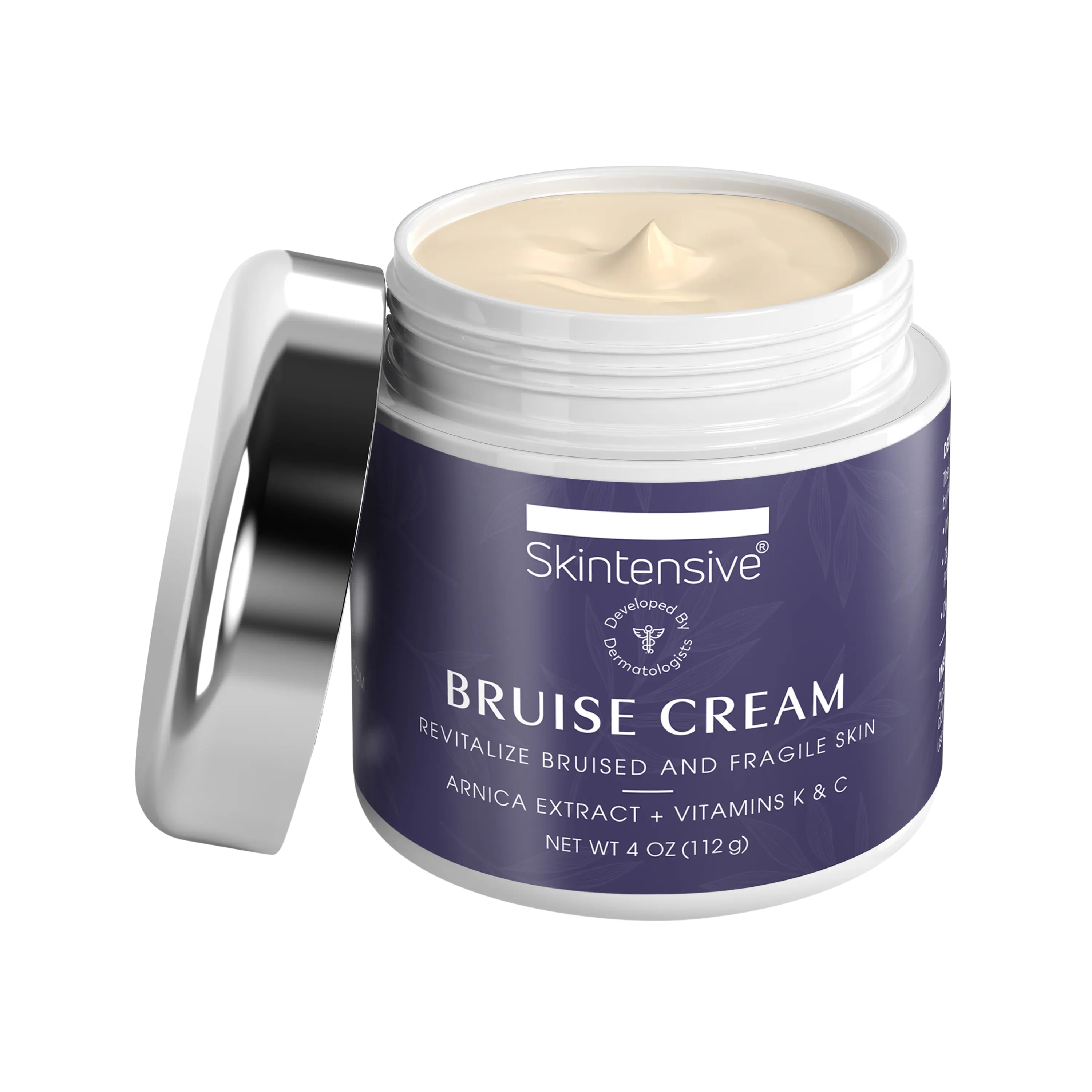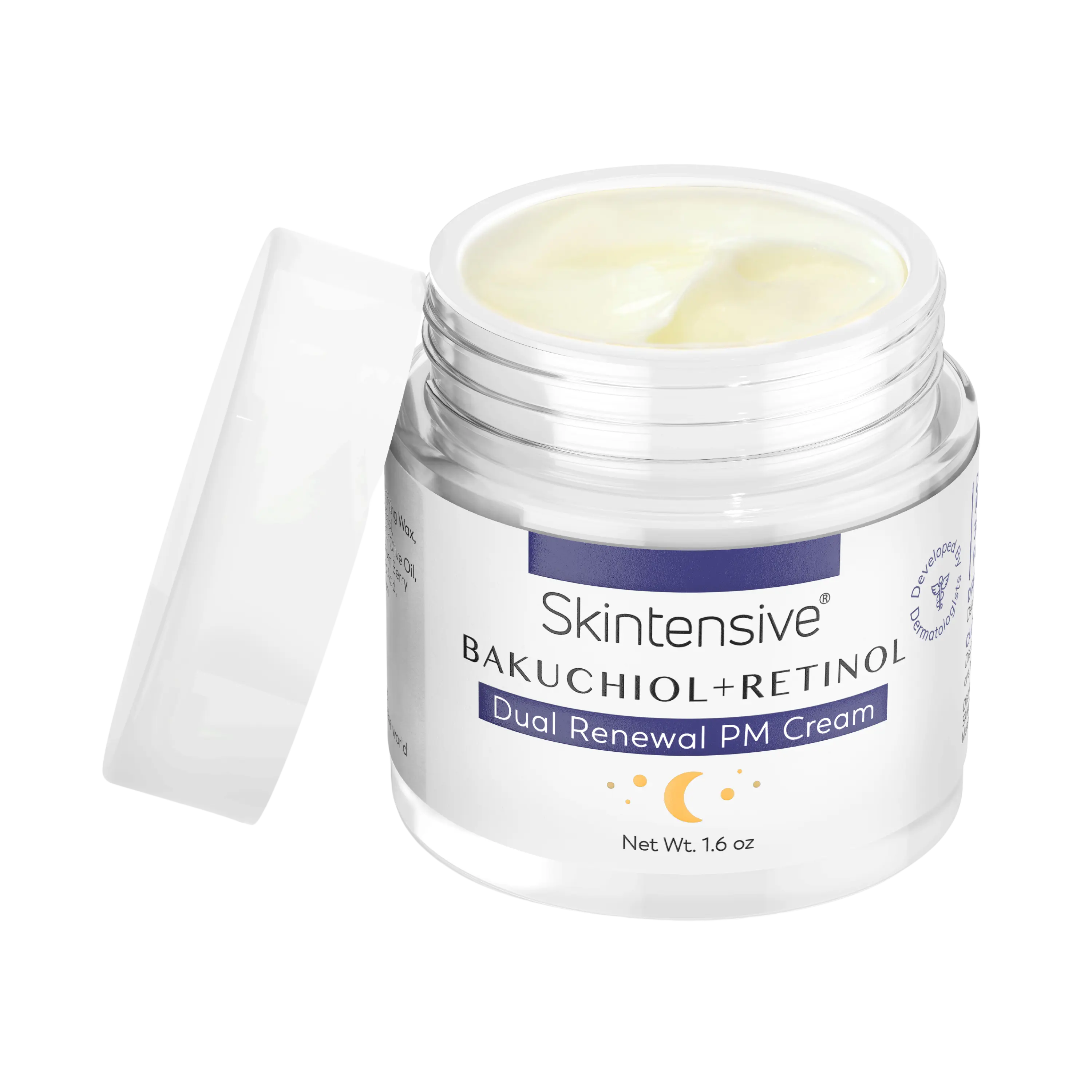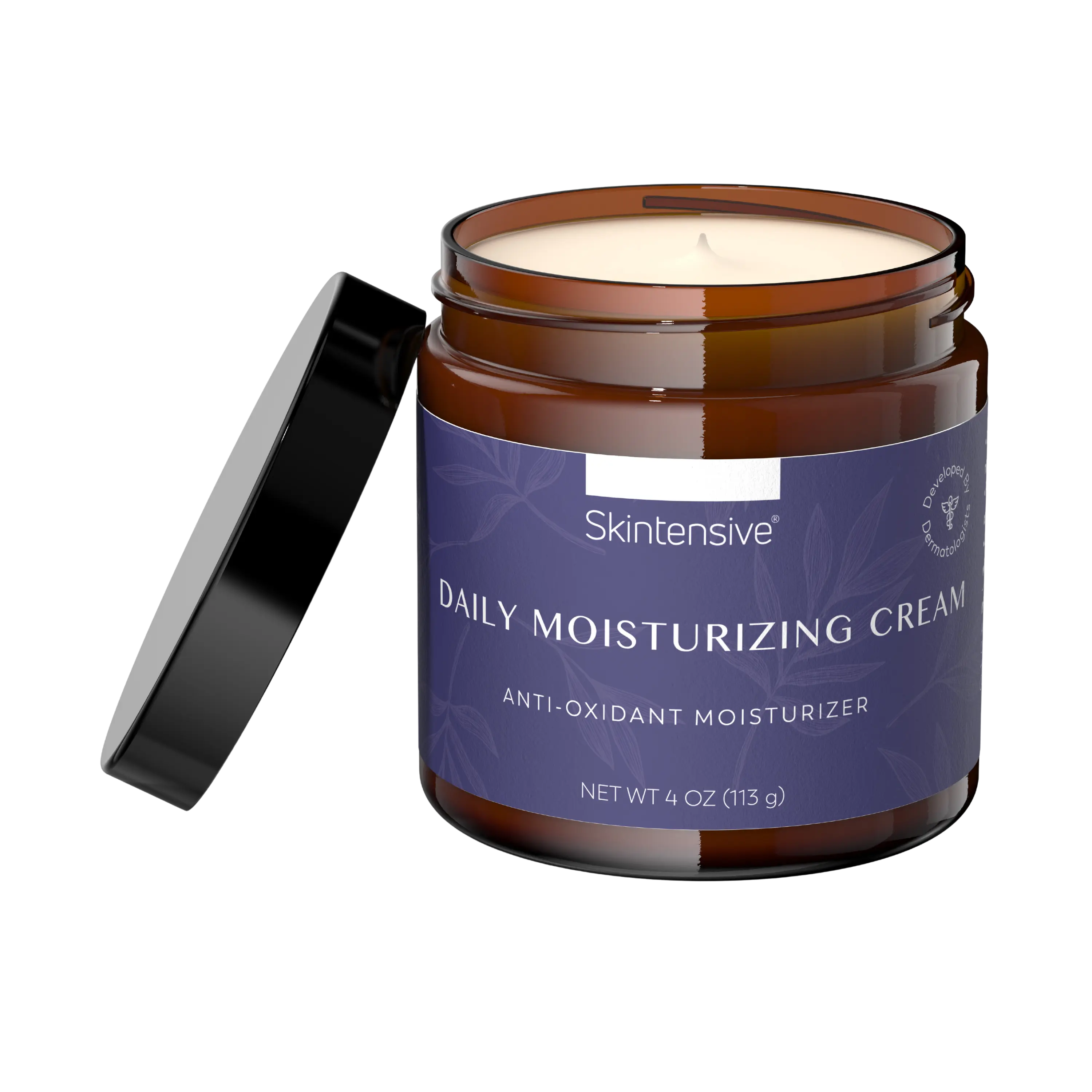Thin Skin & Easy Bruising: Practical, Evidence-Aware Guide (2025)
✨ Quick Take
Skintensive offers a science-aligned approach for skin that bruises easily: layer gentle hydration (hyaluronic acid, vitamins A/C/E/K), consider arnica topicals for inflammation, protect daily with SPF/sun-safe clothing, support collagen via retinoids/AHAs, and talk to your clinician about meds and supplements.
💡 Featured Snippet-Ready Answer
For thin, easily bruised skin, dermatology routines often include twice-daily moisturizing with vitamin-rich and arnica-infused creams, daily SPF and protective clothing, selective use of topical retinoids/AHAs for support, and clinician review of blood-thinner meds or supplements.
Say goodbye to feeling insecure or limiting your activities due to fear of getting bruises. Get ready to embrace newfound confidence and ease knowing that there are solutions within your grasp.
Are you tired of constantly worrying about fragile, thin skin that bruises easily? Imagine this: you wake up one morning, look in the mirror, and notice another mysterious bruise on your arm. You have no recollection of bumping into anything, yet there it is, another unwelcome mark on your delicate skin. If this scenario feels all too familiar, you're not alone.
In our blog on "Skin Care Options for Thin Skin and Easy Bruising," we're going to dive into an effective solution that could revolutionize the way you manage your bruising concerns. We'll be discussing the wonders of arnica cream for bruising, a natural ingredient known for its healing properties. Not only that, but we'll also explore the benefits of using a daily moisturizer that contains arnica, along with nourishing vitamins E, A, and C.
Say goodbye to the constant fear of bruising and hello to a revitalized, resilient complexion. Are you ready to regain your confidence and bid farewell to those pesky bruises?
Get More Resilient Skin Here
Short Summary
- Arnica cream is an effective skin care option for bruising and thin skin, thanks to its natural healing properties.
- Using a daily moisturizer that contains arnica, along with vitamins E, A, and C, can help revitalize and strengthen your skin.
- Bruising concerns can be effectively managed by incorporating arnica cream and a nourishing moisturizer into your skincare routine.
- By following these tips and incorporating these products into your skincare routine, you can regain your confidence and maintain healthy, resilient skin.
Understanding Thin Skin and Easy Bruising
Thin skin and easy bruising can be a common concern among many individuals, particularly as they age. In this section, we will explore the causes of thin skin and easy bruising, as well as some potential skin care options to help improve these conditions.
1.1. Causes of Thin Skin and Easy Bruising
Thin skin and easy bruising can be attributed to a variety of factors. Some common causes include:
1.1.1. Aging: As we age, our skin tends to lose its supportive tissues, such as collagen and elastin, which can cause it to become thinner and more susceptible to damage.
1.1.2. Medications: Certain medications, such as blood thinner medications or steroids, can increase the risk of easy bruising by affecting the blood's ability to clot.
1.1.3. Sun Damage: Prolonged exposure to the harmful UV rays of the sun can weaken the skin's structure, making it more prone to bruising.
1.1.4. Nutritional Deficiencies: Insufficient intake of essential vitamins, such as vitamin C can weaken the blood vessels and make the skin more fragile.
1.2. Skin Care Options for Thin Skin and Easy Bruising
Fortunately, there are several skin care options available to help improve thin skin and reduce the frequency of easy bruising. It's important to note that these options may vary depending on the underlying cause of the condition. Here are some effective options:
1.2.1. Arnica Cream: Arnica cream is a popular natural remedy that has been used for centuries to reduce inflammation and promote healing. Applying arnica cream to bruises can help expedite the healing process and reduce discoloration.
1.2.2. Daily Moisturizer: Using a daily moisturizer that contains ingredients known for their skin-strengthening properties can also be beneficial. Look for moisturizers that contain arnica, vitamin E, vitamin A, and vitamin C, as these nutrients are known to support skin health and promote collagen production.
1.2.3. Proper Nutrition: Ensuring an adequate intake of vital nutrients, especially vitamins C, E, A, and K, through a well-balanced diet can help improve skin health and prevent excessive bruising.
1.2.4. Sun Protection: Protecting your skin from harmful UV rays by wearing sunscreen and avoiding excessive sun exposure
Arnica Cream: An Effective Skin Care Option for Bruising
Bruises can be unsightly and uncomfortable, but there are remedies available to help speed up the healing process and reduce their appearance. One such skin care option is arnica cream, which has gained popularity for its effectiveness in caring for bruises.
Arnica cream contains the extract of the arnica plant, a perennial herb known for its anti-inflammatory properties. This natural ingredient has been used for centuries to address various concerns, including bruising. When applied topically, arnica cream can help reduce pain, inflammation, and discoloration associated with bruises.
Here are some key benefits of using arnica cream for bruising:
- Anti-inflammatory properties: Arnica cream contains compounds that help reduce inflammation, which is often a primary symptom of bruising. By applying arnica cream to the affected area, you can help minimize the swelling and discomfort associated with the bruise.
- Increased blood flow: Arnica cream has been found to stimulate blood circulation, which can aid in the healing process. By promoting blood flow to the affected area, arnica cream helps deliver oxygen and nutrients that are necessary for tissue repair, thereby speeding up the healing time of bruises.
- Pain relief: Bruises can be accompanied by tenderness and pain. Arnica cream, with its analgesic properties, can help alleviate these symptoms by numbing the area and providing temporary relief.
- Reduce discoloration: The appearance of a bruise can often be bothersome, especially in visible areas. Arnica cream has been reported to help fade discoloration by enhancing the absorption of blood that has pooled beneath the skin's surface.
When using arnica cream for bruising, it is essential to follow proper application instructions. Gently massage a small amount of the cream onto the bruised area, taking care not to apply too much pressure, as this could further aggravate the injury. It is worth noting that arnica cream should not be used on broken skin or open wounds.
In addition to arnica cream, incorporating a daily moisturizer that contains arnica, vitamin E, vitamin A, and vitamin C can further promote skin health and resilience. These vitamins provide nourishment and support for the skin.
💡 Key Takeaway: Arnica cream is a beneficial and effective skin care option for bruises, offering anti-inflammatory properties, increased blood flow, and pain relief.
Get More Resilient Skin Here
Daily Moisturizers for Thin Skin and Bruising
Moisturizers play a crucial role in maintaining the health and resilience of our skin. For individuals dealing with thin skin and easy bruising, incorporating a daily moisturizer specifically formulated to address these concerns can be highly beneficial. Here, we explore three effective daily moisturizers that can help improve the condition of thin skin while reducing the likelihood of bruising.
Arnica is a natural herb renowned for its anti-inflammatory and healing properties. When formulated into a moisturizer, arnica can help reduce bruising and promote skin repair. Look for a moisturizer that contains arnica as a key ingredient, ensuring it is derived from a reliable source. The soothing effects of arnica can help alleviate bruising and inflammation, making it an excellent choice for those prone to bruising.
Arnica cream moisturizers are a popular choice for individuals with thin skin and a tendency to bruise easily due to their anti-inflammatory and healing properties.
Vitamins hold significant importance in maintaining healthy skin. Specifically, vitamins E, A, and C are known for their potential benefits in improving skin elasticity and thickness. When choosing a daily moisturizer for thin skin and bruising, opt for one infused with a potent blend of vitamins E, A, and C. These vitamins work synergistically to nourish the skin, promote collagen production, and support the skin.
Look for a daily moisturizer that contains vitamins E, A, and C to enhance skin health.
Ensure that the vitamins used in the formulation are of high quality and from reputable sources.
Regular use of a vitamin-enriched moisturizer can help improve skin thickness and reduce the occurrence of bruises.
- Hyaluronic Acid Moisturizer
Hyaluronic acid is a powerful hydrating ingredient that can benefit individuals with thin skin. It works by attracting and retaining moisture in the skin, improving its plumpness and reducing the appearance of fine lines and wrinkles. Opting for a daily moisturizer that contains hyaluronic acid can help fortify the skin's barrier function, making it more resistant to bruising. This moisture-boosting ingredient also aids in maintaining the skin's natural moisture balance, enhancing its overall health and resilience.
Vitamin E: Nourishing Thin Skin
Vitamin E has long been recognized for its skin-nourishing properties. When it comes to thin skin and easy bruising, incorporating Vitamin E can be beneficial. Here's how Vitamin E can help:
- Promotes healing: Vitamin E is known for its antioxidant properties, which help protect the skin from free radicals and promote faster healing. It can aid in reducing the appearance of bruises and accelerate the healing process.
- Moisturizes and hydrates: Vitamin E is an excellent moisturizer that can help hydrate and nourish thin skin. It works by locking in moisture, improving the skin's ability to retain water, and reducing dryness. By keeping the skin well-hydrated, Vitamin E can enhance its overall health and resilience.
- Anti-inflammatory properties: Vitamin E possesses anti-inflammatory properties that can help reduce inflammation associated with bruising. By calming inflammation, it can alleviate discomfort and the appearance of bruises.
To incorporate Vitamin E into your skincare routine, consider using a daily moisturizer that contains this essential nutrient. Look for products specifically formulated for thin and sensitive skin, as they often have added nourishing ingredients to provide extra care and protection.
Remember to apply the moisturizer gently, using upward motions, to avoid any further trauma to the skin. Consistency is key when it comes to achieving the best results, so make sure to incorporate this step into your daily skincare routine.
💡 key Takeaway: Including Vitamin E in your skincare routine can nourish and support thin skin, promote healing, and reduce the appearance of bruises. Look for moisturizers containing Vitamin E specifically formulated for thin and sensitive skin for optimal results.
Vitamin A: Enhancing Skin Regeneration
Vitamin A, also known as retinol, plays a crucial role in maintaining healthy skin. It is well-regarded for its ability to enhance skin regeneration, making it an essential nutrient for individuals with thin skin and easy bruising. Here, we will delve into the benefits of vitamin A for improving skin health and discuss how it can help combat these concerns.
- Collagen Production:
Vitamin A stimulates the production of collagen, a protein that provides strength and elasticity to the skin. By promoting collagen synthesis, vitamin A helps to improve the structural integrity of the skin, making it less prone to thinning and bruising. Regular use of vitamin A-rich products can effectively boost collagen levels and improve the overall health of the skin.
Vitamin A promotes collagen production, enhancing the skin's strength and resilience.
- Enhanced Cell Turnover:
Another key benefit of vitamin A is its ability to promote cell turnover. It encourages the shedding of dead skin cells and supports the growth of new, healthy cells. This process helps to improve skin texture, reduce the appearance of fine lines and wrinkles, and enhance overall skin health. By accelerating cell turnover, vitamin A aids in the formation of a thicker, more resilient skin barrier that is less susceptible to bruising.
- Antioxidant Protection:
Vitamin A is known for its powerful antioxidant properties. These antioxidants help to neutralize free radicals in the skin, which can cause oxidative stress and damage to the skin cells. By protecting against oxidative stress, vitamin A helps to maintain the integrity of the skin and reduce the risk of bruising. It also supports the skin's natural repair mechanisms, aiding in the healing process of damaged skin.
Promotes collagen production for stronger skin
Accelerates cell turnover for a thicker skin barrier
Provides antioxidant protection against free radicals
💡 key Takeaway: Vitamin A, found in various skincare products, plays a vital role in enhancing skin regeneration. By promoting collagen production, accelerating cell turnover, and providing antioxidant protection, it can help improve thin skin and reduce the risk of easy bruising.
Vitamin C: Boosting Collagen Production
Collagen is a protein found in our bodies that helps maintain the strength, elasticity, and structure of our skin. As we age, collagen production naturally decreases, leading to thinning skin and increased susceptibility to bruising. Thankfully, incorporating vitamin C into your skincare routine can help combat these effects.
- Include Vitamin C-Rich Foods in Your Diet
Consuming foods high in vitamin C can provide your body with the necessary nutrients for collagen synthesis. Incorporate citrus fruits like oranges and grapefruits, leafy greens such as kale and spinach, and berries like strawberries and blueberries into your meals to boost your vitamin C intake.
- Integrate a Daily Moisturizer with Vitamin C
Besides consuming vitamin C, applying it topically can also be beneficial for your skin. Look for a daily moisturizer that contains vitamin C as one of its key ingredients. These moisturizers can improve the appearance of thin skin and help reduce the visibility of bruises over time. Be sure to check the product label and choose one with a stable form of vitamin C, such as L-ascorbic acid, for maximum efficacy.
- Consider Vitamin C Serums
For a more concentrated source of vitamin C, adding a serum infused with this potent antioxidant to your skincare routine can work wonders. Serums typically have a higher concentration of active ingredients, allowing for better absorption into the skin. Apply a few drops of the serum to clean skin before moisturizing, making sure to gently massage it in for optimal absorption.
- Combine Vitamin C with Other Skin-Nourishing Ingredients
Opt for skincare products that not only contain vitamin C but also incorporate other beneficial ingredients like arnica, vitamin E, and vitamin A. Arnica has long been used to reduce bruising and inflammation, while vitamin E and vitamin A promote skin healing and overall skin health.
- Don't Forget Sun Protection
Remember, protecting your skin from harmful UV rays is crucial for maintaining its health and preventing further thinning. UV radiation can break down collagen fibers, accelerating the aging process. Always use a broad-spectrum sunscreen with an SPF of 30 or higher, even on cloudy days, and reapply it every two hours when exposed to the sun.
💡 Key Takeaway: Boosting collagen production through the use of vitamin C can help strengthen thin skin and reduce the occurrence of bruising. Incorporate vitamin C-rich foods into your diet, choose a daily moisturizer with vitamin C
Your Gentle Routine at a Glance
Ingredients & Comfort Goals
❓ FAQ
Q1: Can retinoids really thicken thinning skin?
Yes — topical retinoids (retinol, tretinoin) encourage collagen growth and may increase dermal thickness over time skintreatment.com.
Q2: How does arnica help with bruising?
Arnica cream has anti-inflammatory properties (helenalin) and enhances circulation, which can reduce swelling, pain, and discoloration from bruises skintensive.com.
Q3: What lifestyle changes help prevent bruising?
Protect skin with sunscreen, wear long sleeves and hats, stay hydrated, eat nutrient-dense foods (Vitamins A, C, E, K), and avoid blood-thinning medications when possible, mayoclinic.org.
Q4: Should I see a doctor for easy bruising?
Yes — especially if bruises appear without injury, are large, or accompanied by bleeding, as this might signal medication side effects, clotting disorders, or nutritional deficiencies.
Q5: Are topical vitamin K creams effective?
Vitamin K creams may help reduce bruising but aren't proven to thicken skin—use them alongside collagen-supportive actives for best results.
The content in this article is not medical advice, but rather informational content. As a service to our readers, Skintensive provides access to our library of archived blog content. Please note the date of last review or update on all articles. No content on this site, regardless of date, should ever be used as a substitute for direct medical advice from your doctor or other medical professional.







